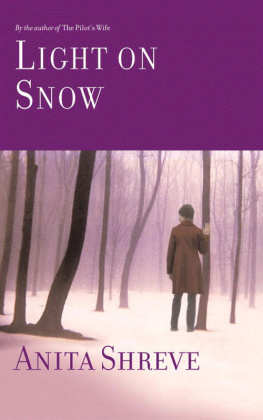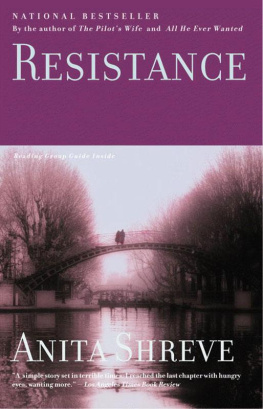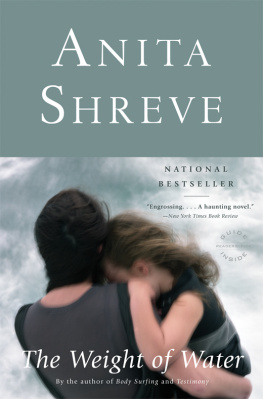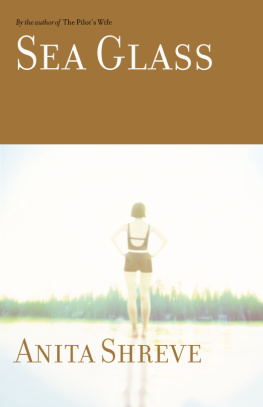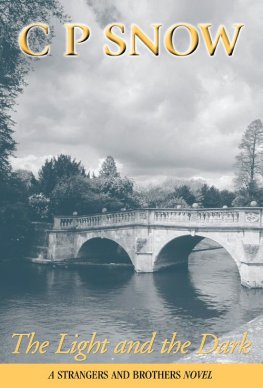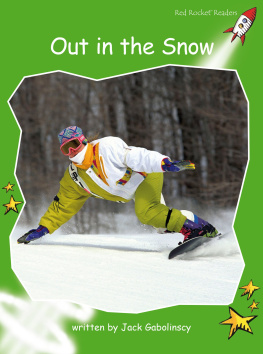Copyright 2004 by Anita Shreve
All rights reserved. No part of this book may be reproduced in any form or by any electronic or mechanical means, including information storage and retrieval systems, without permission in writing from the publisher, except by a reviewer who may quote brief passages in a review.
Little, Brown and Company
Hachette Book Group, USA
237 Park Avenue, New York, NY 10017
Visit our Web site at www.hachettebookgroupusa.com
First eBook Edition: October 2004
The characters and events in this book are fictitious. Any similarity to real persons, living or dead, is coincidental and not intended by the author.
ISBN: 978-0-7595-1277-1
All He Ever Wanted
Sea Glass
The Last Time They Met
Fortunes Rocks
The Pilots Wife
The Weight of Water
Resistance
Where or When
Strange Fits of Passion
Eden Close
for my mother
B eyond the window of my fathers shop, midwinter light skims the snow. My father stands, straightening his back.
How was school? he asks.
Good, I say.
He puts his sander down and reaches for his jacket on a hook. I run my hand along the surface of the table. The wood is floury with dust, but satin underneath.
You ready? he asks.
Im ready, I say.
My father and I leave his workshop in the barn and walk out into the cold. The air, dry and still, hurts my nose as I breathe. We lace up our snowshoes and bang them hard against the crust. A rust color is on the bark, and the sun is making purple shadows behind the trees. From time to time the light sends up a sheen of pocked glass.
We move at a good clip, dodging pine boughs, occasionally catching a shower on the back of the neck. My father says, I feel like a dog let out to exercise at the end of the day.
The stillness of the forest is always a surprise, as if an audience had quieted for a performance. Beneath the hush I can hear the rustle of dead leaves, the snap of a twig, a brook running under a skin of ice. Beyond the woods theres the hollow road-whine of a truck on Route 89, the drone of a plane headed into Lebanon. We follow a path that is familiar, that will end at a stone wall near the summit. The wall, square on three sides, once bordered a farmers property. The house and barn are gone, and only the foundations remain. When we reach the wall, my father will sometimes sit on it and have a cigarette.
I am twelve on this mid-December afternoon (though I am thirty now), and I dont know yet that puberty is just around the corner, or that the relentless narcissism of a teenage girl will make walking in the woods with my father just about the last thing Ill want to do on any given day after school. Taking a hike together is a habit my father and I have grown into. My father spends too many hours bent to his work, and I know he needs to get outside.
After the table is finished, my father will put it in the front room with the other furniture he has made. Fourteen pieces in two years isnt much of an output, but hes had to teach himself from books. What he cant learn from manuals, he asks a man called Sweetser down at the hardware store. My fathers furniture is simple and rudimentary, and that is fine with him. It has a decent line and a passable finish, though none of that matters. What matters is that the work keeps him busy and is unlike anything he has ever done before.
A branch snaps and scratches my cheek. The sun sets. We have maybe twenty minutes left of decent light. The route back to the house is easy all the way down and can be done in less than ten. We still have time to reach the wall.
I hear the first cry then, and I think it is a cat. I stop under a canopy of pine and listen, and there it is again. A rhythmic cry, a wail.
Dad, I say.
I take a step toward the sound, but as abruptly as it began, it ends. Behind me snow falls with a muted thump onto the crust.
A cat, my father says.
We begin the steep climb up the hill. My feet feel heavy at the ends of my legs. When we reach the summit, my father will judge the light, and if theres time hell sit on the stone wall and see if he can make out our housea smidgen of yellow through the trees. There, he will say to me, pointing down the hill, can you see it now?
My father has lost the weight of a once sedentary man. His jeans are threadbare in the thighs and tinged with the rusty fur of sawdust. At best he shaves only every other day. His parka is beige, stained with spots of oil and grease and pine pitch. He cuts his hair himself, and his blue eyes are always a surprise.
I follow his tracks and pride myself that I no longer have any trouble keeping up with him. Over his shoulder he tosses me a Werthers candy, and I catch it on the fly. I pull off my mittens, tuck them under my arm, and begin to unwrap the cellophane. As I do I hear the distant thunk of a car door shutting.
We listen to the sound of an engine revving. It seems to come from the direction of a motel on the northeast side of the hill. The entrance to the motel is further out of town than the road that leads to our house, and we seldom have a reason to drive by it. Still, I know it is there, and I sometimes see it through the trees on our walksa low, red-shingled building that does a decent business in the ski season.
I hear a third cry thenheartbreaking, beseeching, winding down to shuddering.
Hey! my father calls.
In his snowshoes he begins to run as best he can in the direction of the cry. Every dozen steps he stops, letting the sound guide him. I follow, and the sky darkens as we go. He takes a flashlight from his pocket and switches it on.
Dad, I say, panic rising in my chest.
The beam of light jiggles on the snow as he runs. My father begins to sweep the flashlight in an arc, back and forth, side to side. The moon lifts off the horizon, a companion in our search.
Anybody there? he calls out.
We move laterally around the base of the slope. The flashlight flickers off and my father shakes it to reconnect the batteries. It slips out of his glove and falls into a soft pocket of snow beside a tree, making an eerie cone of light beneath the crust. He bends to pick it up, and as he raises himself, the light catches on a patch of blue plaid through the trees.
Hello! he calls.
The woods are silent, mocking him, as if this were a game.
My father waves the flashlight back and forth. Im wondering if we shouldnt turn around and head back to the house. Its dangerous in the woods at night; its too easy to get lost. My father makes another pass with the flashlight, and then another, and it seems he has to make twenty passes before he catches again the patch of blue plaid.
Theres a sleeping bag in the snow, a corner of flannel turned over at its opening.
Stay here, my father says.
I watch my father run forward in his showshoes, the way one sometimes does in dreamsunable to make the legs move fast enough. He crouches for better leverage and keeps a steady bead on the bag. When he reaches the plaid flannel, he tears it open. I hear him make a sound unlike any I have ever heard before. He falls to his knees in the snow.
Dad! I shout, already running toward him.
My arms are flailing, and it feels as though someone is pushing against my chest. My hat falls off, but I keep on clumping through the snow. I am breathing hard when I reach him, and he doesnt tell me to go away. I look down at the sleeping bag.
A small face gazes up at me, the eyes wide despite their many folds. The spiky black hair is gelled with birth matter. The baby is wrapped in a bloody towel, and its lips are blue.

